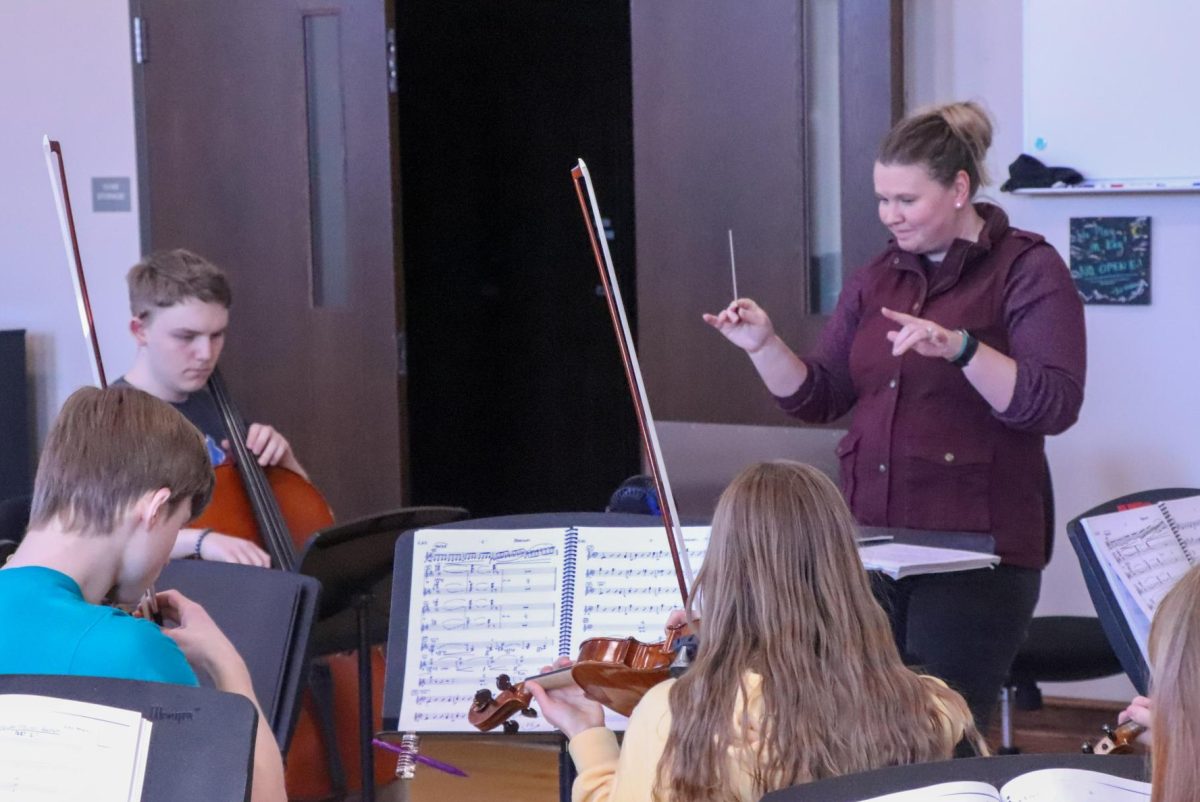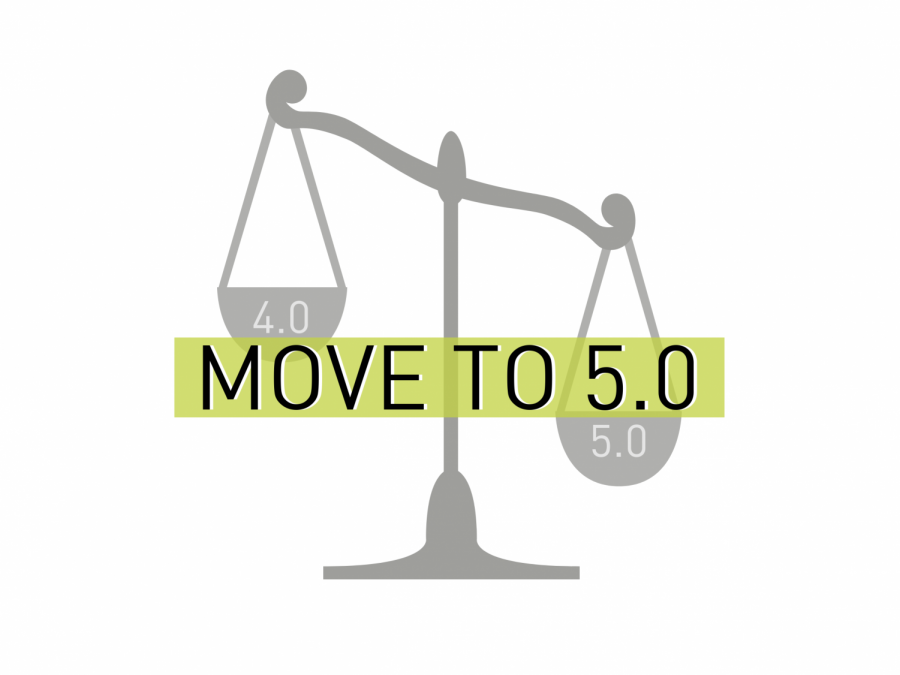Balancing Act
For years, graduates of City High School and other schools in the Iowa City Community School District have not been using a weighted grade point average system. In many cases, when these graduates applied for college admissions and financial aid, their GPAs were compared to weighted GPAs, making it harder for these graduates to get the same opportunities as graduates from colleges with a weighted GPA system.
“I worry over the years, how many students lost out on big dollars because they didn’t quite hit the GPA requirement,” Principal John Bacon said. “It bothers me and I am glad we are fixing it.”
Most colleges in Iowa do not differentiate between weighted and unweighted GPAs. Those colleges use the GPA that “is most beneficial for the student.” This means that unweighted GPAs are directly compared to weighted GPAs, so City students had to get better grades in their AP/Honors classes to get the same GPA and the same chances.
“The reality to me is that the ship has sailed on that issue [of weighted vs. unweighted GPAs] in our state. We have to get on board so that our kids aren’t at a disadvantage,” Bacon said. “I am really pleased that we are doing that.”
Starting with the 2019-20 school year, the Iowa City Community School District will be implementing a weighted GPA system for AP and honors classes. This means that the grading scale for AP and honors will be changed to a 5.0 grading scale for only those classes. If a student takes an AP or honors class and gets an A in that class, that will be five points factored into the GPA instead of four points. Then going down, a B would be four points, a C would be three points and so on, with an F still being 0 points. The grading scale will also be standardized with an A ending at 90%, B at 80%, C at 70% and D at 60%.
“It’s a big deal for us,” Bacon said. “It’s something that I think is long overdue and positive.”
The first time this issue was brought to Bacon’s attention was a few years ago when a parent of a student, who was applying for financial aid, realized that their kid was at a disadvantage. They told Bacon that they had to hit certain GPA cutoffs, which was harder to do at City High than at a high school using a weighted system.
“I had looked into this a little bit at the time and I was under the impression that they were adjusting,” Bacon said. “I really believed that was correct at the time. It stuck with me.”
Bacon mentioned his own son applying to college and how he has noticed that colleges look at GPA and then giving the student financial aid according to their GPA, without considering weighting.
“Personally, I have seen things this year through new eyes because I have a son that is a senior,” Bacon said. “Going through the application process and learning about financial aid, you start to understand things a little differently. All of the sudden it’s personal, and you get it.”
With Bacon’s encouragement for change, Diane Schumacher, who is in her third year as Curriculum Director for the Iowa City Community School District, began investigating how many colleges adjust for weighted GPAs. She sent out a mass email to the admissions and scholarship departments of every college and university in the state of Iowa. With the results, she made a spreadsheet color-coordinating the colleges green if weighting helped and white if it did not make a difference.
“I was going to make it red if weighting seemed to harm a kid,” Schumacher said. “I did not find any place where it did.”
Almost all of the colleges will take the GPA regardless if the student is under a weighted GPA system, with an exception of some of the more selective colleges. However, Schumacher did not contact more prestigious colleges such as the Ivy League schools.
“I started just with the Iowa colleges. I couldn’t do every place in the nation, and that is where the majority of our kids go,” Schumacher said. “Because in our survey of Iowa schools [changing to a weighted GPA] didn’t hurt anybody, I just can’t imagine that it would hurt someone going to an Ivy League either.”
Schumacher also contacted the other Urban Education Network (UEN) schools, which are other school with a high number of student population in Cedar Rapids, Des Moines, and Davenport, and asked their curriculum directors if they did weighted or unweighted GPAs. She found out that most of them used weighted grading systems and shared all of the information she had gathered with the secondary administrators.
“They all agreed, if it’s going to help our students, we should move forward with this,” Schumacher said.
The next decision was choosing which classes to weigh. Most other UEN schools weight AP classes and either honors, college classes, or Project Lead The Way courses. The administrators of the Iowa City Community School District decided to start with weighing AP and honors Courses.
“A couple of [the curriculum administrators of other UEN schools] told me ‘get ready because when you start down the road of weighted grades, you’re going to get every teacher saying ‘weight my course, it should be weighted too. My kids work really hard and should have a weighted grade as well,’” Schumacher said.
The graduating class of 2019 will be the last class of City High students to have valedictorians. Starting next school year, a new system will be in place. A students with a GPA between 3.50 and 3.74 will be considered cum laude, 3.75 to 4.00 is magna cum laude and 4.01 or higher will be summa cum laude.
“When I was a young girl, I learned what a valedictorian was, and from that point I kind of knew it was something I wanted to try and achieve,” Victoria Weckmann ‘21 said. “Since getting to high school, I have worked really hard to keep my grades up so I could qualify for valedictorian, so when they decided to change the system it was a little disappointing.”
Weckmann understands that valedictorian and summa cum laude is just a title that you graduate with, but she finds the sudden change in the system a little disheartening.
“I always liked the idea of a valedictorian system. I think the whole idea behind honoring a student at graduation is that you’re honoring someone who worked really hard through high school in order to achieve great things. Because the summa cum laude system makes it easier to be one of the distinguished students at graduation, I think it takes away some of the value of the idea behind the whole thing,” Weckmann said.
However, some students think that the move away from valedictorian is a good thing. With the news of the new weighted GPA system, the seniors won’t get a chance to benefit from it. Kate Murray ‘19 expressed her feelings about the two subjects.
“I have some mixed feelings because I am a senior,” Murray said. “It’s a little bittersweet because I am sad I don’t get to experience it. I am [also] glad that the younger generations will.”
In her opinion, the current valedictorian system only represents those kids who get As in easy classes. While she knows there are kids who get all As in harder classes, she feels like without weighting, those kids are at a disadvantage.
“I don’t think [the valedictorian system] is representative of the students how take more difficult classes but get one or two Bs,” Murray said. “I think this [new cum laude system] will be more representative of the students who try harder at City High and it will reward them for that.”
With this new system, Murray encourages everyone to enroll in AP and honors classes. She is excited that taking the risk of a harder class will no longer negatively impact a student’s GPA.
“Take advantage of this!,” Murray said. “I have not gotten to take advantage of this and never will on the highschool level. So that means you should be able to take as many AP and honors classes as you want because now even if you get a B it will show that you are trying harder and learning more.”
While this sounds very encouraging, Jason Schumann, who teaches AP World History at City High, warns students to not overload their schedules.
“While the purpose of the policy– encouraging students to take more academically rigorous classes to better prepare them for college– is certainly admirable, I do worry it might lead to some problems down the road with students being overscheduled,” Schumann said. “I can envision a situation where students are registering for a bunch of AP and honors classes simply because they want to chase a higher GPA.”
When signing up for AP and honors classes, Schumann challenges students to ask themselves “Would I want to do an assignment for that class at 1:00am?” If the answer is no, the student should seriously reassess if they want to take the class.
“If the class covers a subject you are genuinely interested in, then the assignments do not really feel like work, and the more rigorous class is a good fit,” Schumann said. “When registering for classes, students should be encouraged to create a schedule that offers academic challenge, but also is realistic given the student’s other time commitments.”
The big question for the students at City High during the transitioning period, is what to do on their college applications, when they are submitting a GPA that is partly weighted and partly unweighted. The solution that the administrators, especially guidance counselor Linda Hoel, are currently working on to explain the transition is adding an explanation in both the high school profile that City sends to all colleges that any City High students apply to and either on the transcript itself or the profile on the Common Application, in the section of weighing on the transcript. Additionally, any student may request a standard letter explaining the weighting system that can be submitted to any college where they are applying.
“[Telling colleges about the transitioning period] is a continuing issue and concern and there is more study and research and thinking that it going to go into it, so we don’t have a final responses yet but this is a starting point,” Hoel said. “I know that whatever decision everyone comes up with will be a student friendly decision because our whole purpose is to make this more equitable for our students.”
There is particular worry about what box to check when applying to colleges: the one that the GPA says that it is weighted or the one that says that it is not.
“I would go back to a counselor and ask them what they would recommend you checking and then if there is anywhere on the application where you can write out an explanation or anything like that, you could say ‘Please let me explain. I checked weighted, however that only applies to my senior year,’” Schumacher said. “I then if you feel like you need more explanation, they could send a letter along with it to.”
Evan McElroy ‘21 will have two years without weighting and two years with weighting factored into his GPA. He thinks that the change to weighted GPAs is a good thing, but is sceptical with the way that this change is being implemented.
“I think that adding notes on the transcript is a half measure. It wouldn’t surprise me if colleges don’t read the notes because the GPA is already too low,” McElroy said. “While it won’t be fun to retroactively change GPAs, I think that it is a necessary step if the district wants to do the change.”
He is extremely worried about colleges not being properly informed about this transition period.
“I don’t know what the solutions is, but I don’t think that leaving the old grades alone is it,” McElroy said. “All in all if they want to change the future years, I think that they need to change the past years as well.”
Many other students and parents also wish that the GPAs could be retroactively weighted. However, the administration does not feel comfortable doing this for a variety of reasons including that some AP teachers use an extended grading scale, making 85% count as an A, to encourage students to take their classes without risking their GPAs.
“The fact that they might have made that adjustment and we would weigh it, it seems like some of those kids might have the benefit of a double bonus,” Schumacher said. “Then you also would have kids [saying] ‘wait, I would have taken an AP course if I would have known it was weighted.’”
While she wishes that the school district could have made this change sooner, Schumacher believes that not changing the weighting is for the best, as it would not be fair to students who chose to not take an AP or honors classes due to worries about their GPA.
“We just felt like we could not turn back time and make those changes for those kids in the past, that we would have to do this from this point forward,” Schumacher said.
As with any change, there are a lot of mixed feelings about the Iowa City Community School District’s new weighted GPA system. However, the concerns are mainly about the transition period. Starting with the class 2023, students will have all four years of weighted GPAs.
“It’s a fresh start moving forward,” Bacon said. “Our students were at a tremendous disadvantage. By us making this change we are leveling the playing field for our kids.”
Your donation will support the student journalists of Iowa City High School. For 2023, we are trying to update our video and photo studio, purchase new cameras and attend journalism conferences.

Natalie is a senior this year. She is excited to work on both the newspaper and yearbook staff.
















































